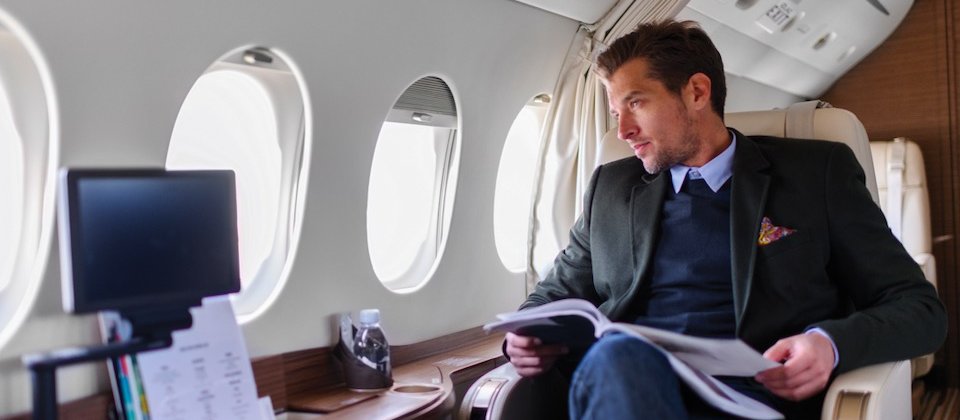Respiratory physician Lutz Beckert considers chronic obstructive pulmonary disease management, including the prevention of COPD, the importance of smoking cessation and pulmonary rehabilitation, and the lifesaving potential of addressing treatable traits. He also discusses the logic of inhaler therapy, moving from single therapy to dual and triple therapy when indicated, as well as other aspects of management
Long-haul a climate dilemma
Long-haul a climate dilemma

It’s a disaster for New Zealand to host big international conferences
Overseas-trained doctor Dermot Coffey is checking his conscience about flights to his home country.
Dr Coffey, who immigrated 20 years ago, says he hasn’t been back to Ireland in the past four years and it would be hard never to make the trip again.
Keeping to the bare minimum is not ideal for family, he says, although longhaul travel is about the worst thing an individual can do for the environment.
On the other side of the ledger for this Christchurch-based specialist GP, a co-convenor of Ora Taiao – New Zealand Climate & Health Council, are the cycling and walking he and his family do. He says they don’t do a lot of car travel.
While he fully understands international medical graduates wanting to fly long haul to visit family and friends, he’s against frequent offshore conference-going by doctors.
Dr Coffey calls on doctors to question their need to attend, suggesting that virtual meetings will often suffice, and sabbaticals can be taken far less often, but for longer.
Offshore travel is a large contributor to DHBs’ greenhouse gas emissions. Capital & Coast DHB’s second-largest source of emissions in 2018/19 (before COVID-19 measures affected most travel) was international businessclass flights.
Business class should be a no-no, Dr Coffey says, as it pollutes far more than economy. Funding doctors’ flights for continuing medical education does not align with DHBs’ climate goals and statements, he adds.
And he says it’s a “disaster” for New Zealand to host big international conferences – including for the RNZCGP to host the WONCA Asia-Pacific Regional Conference.
“So, instead of 50 people going overseas you’ve got 2000 flying in…the emissions from that – regardless of whether the conference is zero carbon, or trees are planted, or everybody gets an environmentally friendly conference pack – the damage has been done by them getting here.”
These events won’t be acceptable in the future, he says. “It will turn the Christchurch Convention Centre into a white elephant, but the warnings were there very clearly before it was built. The pandemic has accelerated that.”
The pandemic-affected WONCA event, originally intended for Auckland, is not now on the college’s agenda.
RNZCGP president Samantha Murton says the pandemic has helped hugely in stopping a lot of air travel but this will return, “because people do that”.
“International visitors will come here as tourists, whether we have our conference or not,” Dr Murton says.
She points out airlines are working on fuel efficiency and alternative fuels.
However, “stopping people travelling by plane is like stopping Formula 1 racing”, Dr Murton says. It won’t happen: “[They] make money…they need to be responsible.”
- Business-class long-haul flights generate twice the emissions per passenger as economy.
- When one person flies economy from, say, Auckland to Vancouver return, they generate more than 1000kg of CO2 from the flights alone.
- COVID-19 lockdowns in many countries led to a 45 per cent reduction in international aviation emissions in 2020 compared with the previous year.
- Most personal actions taken to reduce emissions have small mitigation potential (recycling, ecodriving), rather than high impact (less flying, living car free).
Sources: International Civil Aviation Association; Climate Change 2022: Mitigation of Climate Change – Intergovernmental Panel on Climate Change
- Energy makes up 40 per cent of New Zealand’s gross greenhouse gas emissions, second only to agriculture at 50 per cent.
- Energy for transport uses 42 per cent of the energy sector’s contribution (or 17 per cent of gross emissions).
- New Zealanders’ international travel is not counted in the country’s emissions reporting.
Source: NZ Greenhouse Gas Inventory 1990–2020
Shift the transport budget’s focus away from building road capacity and encouraging motor vehicle use, says the New Zealand College of Public Health Medicine. Rather, says the college, investment in infrastructure and services should prioritise:
- universal design concepts that consider access and public transport for emergencies and all disabilities, including people using guide dogs, pushchairs, walking sticks, wheelchairs, mobility scooters; invalids and people with disabilities and their caregivers, people with babies and toddlers, during late-stage pregnancy, and senior citizens; emergency vehicle access
- walking and cycling
- zero-carbon public and freight transport systems (electric rail and buses, car share, low-carbon shipping)
- avoidance of longer trips through enhanced technology, and
- transition to a smaller, zero-carbon vehicle fleet.
Source: Priority Actions for Climate Health 2018
We're publishing this article as a FREE READ so it is FREE to read and EASY to share more widely. Please support us and the hard work of our journalists by clicking here and subscribing to our publication and website





![Barbara Fountain, editor of New Zealand Doctor Rata Aotearoa, and Paul Hutchison, GP and senior medical clinician at Tāmaki Health [Image: Simon Maude]](/sites/default/files/styles/thumbnail_cropped_100/public/2025-03/Barbara%20Fountain%2C%20editor%20of%20New%20Zealand%20Doctor%20Rata%20Aotearoa%2C%20and%20Paul%20Hutchison%2C%20GP%20and%20senior%20medical%20clinician%20at%20T%C4%81maki%20Health%20CR%20Simon%20Maude.jpg?itok=-HbQ1EYA)
![Lori Peters, NP and advanced health improvement practitioner at Mahitahi Hauora, and Jasper Nacilla, NP at The Terrace Medical Centre in Wellington [Image: Simon Maude]](/sites/default/files/styles/thumbnail_cropped_100/public/2025-03/2.%20Lori%20Peters%2C%20NP%20and%20advanced%20HIP%20at%20Mahitahi%20Hauora%2C%20and%20Jasper%20Nacilla%2C%20NP%20at%20The%20Terrace%20Medical%20Centre%20in%20Wellington%20CR%20Simon%20Maude.jpg?itok=sUfbsSF1)
![Ministry of Social Development health and disability coordinator Liz Williams, regional health advisors Mary Mojel and Larah Takarangi, and health and disability coordinators Rebecca Staunton and Myint Than Htut [Image: Simon Maude]](/sites/default/files/styles/thumbnail_cropped_100/public/2025-03/3.%20Ministry%20of%20Social%20Development%27s%20Liz%20Williams%2C%20Mary%20Mojel%2C%20Larah%20Takarangi%2C%20Rebecca%20Staunton%20and%20Myint%20Than%20Htut%20CR%20Simon%20Maude.jpg?itok=9ceOujzC)
![Locum GP Helen Fisher, with Te Kuiti Medical Centre NP Bridget Woodney [Image: Simon Maude]](/sites/default/files/styles/thumbnail_cropped_100/public/2025-03/4.%20Locum%20GP%20Helen%20Fisher%2C%20with%20Te%20Kuiti%20Medical%20Centre%20NP%20Bridget%20Woodney%20CR%20Simon%20Maude.jpg?itok=TJeODetm)
![Ruby Faulkner, GPEP2, with David Small, GPEP3 from The Doctors Greenmeadows in Napier [Image: Simon Maude]](/sites/default/files/styles/thumbnail_cropped_100/public/2025-03/5.%20Ruby%20Faulkner%2C%20GPEP2%2C%20with%20David%20Small%2C%20GPEP3%20from%20The%20Doctors%20Greenmeadows%20in%20Napier%20CR%20Simon%20Maude.jpg?itok=B0u4wsIs)
![Rochelle Langton and Libby Thomas, marketing advisors at the Medical Protection Society [Image: Simon Maude]](/sites/default/files/styles/thumbnail_cropped_100/public/2025-03/6.%20Rochelle%20Langton%20and%20Libby%20Thomas%2C%20marketing%20advisors%20at%20the%20Medical%20Protection%20Society%20CR%20Simon%20Maude.jpg?itok=r52_Cf74)
![Specialist GP Lucy Gibberd, medical advisor at MPS, and Zara Bolam, urgent-care specialist at The Nest Health Centre in Inglewood [Image: Simon Maude]](/sites/default/files/styles/thumbnail_cropped_100/public/2025-03/7.%20Specialist%20GP%20Lucy%20Gibberd%2C%20medical%20advisor%20at%20MPS%2C%20and%20Zara%20Bolam%2C%20urgent-care%20specialist%20at%20The%20Nest%20Health%20Centre%20in%20Inglewood%20CR%20Simon%20Maude.jpg?itok=z8eVoBU3)
![Olivia Blackmore and Trudee Sharp, NPs at Gore Health Centre, and Gaylene Hastie, NP at Queenstown Medical Centre [Image: Simon Maude]](/sites/default/files/styles/thumbnail_cropped_100/public/2025-03/8.%20Olivia%20Blackmore%20and%20Trudee%20Sharp%2C%20NPs%20at%20Gore%20Health%20Centre%2C%20and%20Gaylene%20Hastie%2C%20NP%20at%20Queenstown%20Medical%20Centre%20CR%20Simon%20Maude.jpg?itok=Z6u9d0XH)
![Mary Toloa, specialist GP at Porirua and Union Community Health Service in Wellington, Mara Coler, clinical pharmacist at Tū Ora Compass Health, and Bhavna Mistry, specialist GP at Porirua and Union Community Health Service [Image: Simon Maude]](/sites/default/files/styles/thumbnail_cropped_100/public/2025-03/9.%20Mary%20Toloa%2C%20Porirua%20and%20Union%20Community%20Health%20Service%20in%20Wellington%2C%20Mara%20Coler%2C%20T%C5%AB%20Ora%20Compass%20Health%2C%20and%20Bhavna%20Mistry%2C%20PUCHS%20CR%20Simon%20Maude.jpg?itok=kpChr0cc)